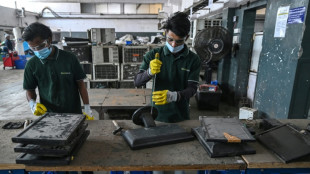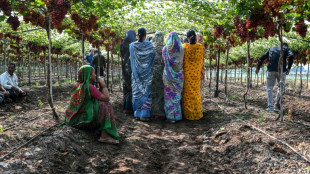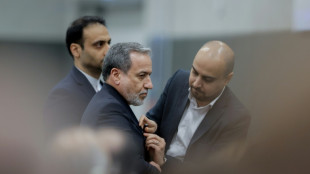
Russia bets on patriotism to address demographic crisis

Freshly married to a policeman, office manager Angelina Alexeyeva has been motivated by President Vladimir Putin's plea for Russians to have more children, part of the Kremlin's ultra-patriotic drive as its Ukraine offensive drags on.
Russia's dwindling birth rate has been one of Putin's main worries during his 25-year rule.
And with Moscow having sent hundreds of thousands of young men to the front in Ukraine over the last three years, the demographic crisis has only worsened.
The Kremlin chief casts Russia's shrinking population as a matter of national survival and has rolled out a raft of pro-family policies and rhetoric to try to solve the challenge.
"It's extinction," Putin warned in a government meeting in December, urging Russians to do their patriotic duty and have larger families.
The message resonated with Alexeyeva, who plans to start a family with her new husband.
"We now value our country more, our nation, we are more patriotic than before," the 34-year-old told AFP.
"I want at least three children."
Russia's birth rate was officially 1.41 per woman in 2023 -- far below the 2.1 that demographers say is necessary for a stable population.
Some experts warn it will only get worse.
"The number of Russians of reproductive age will fall by 40 percent from 2010 to 2030," independent demographer Alexei Raksha, branded a "foreign agent" in Russia, told AFP.
The number of births this year is set to be the lowest in at least 225 years, he added.
The government's Rosstat statistics service counts Russia's official population at 145.6 million -- including 2.5 million in Crimea, the Ukrainian peninsula annexed by Moscow in 2014.
That could shrink by 15 million over the next 20 years, according to Rosstat's own pessimistic forecast, published last year.
- 'National curse' -
While birth rates are falling across the developed world, population decline is especially visible in the world's largest country.
Male life expectancy -- long plagued by alcoholism -- is particularly low in Russia, at just 68.04 according to official data from 2023, 12 years less than for women.
But Raksha said the Kremlin's Ukraine campaign has cut that even further, estimating it now hovers "just above 66."
Russia does not reveal how many men have been killed fighting in Ukraine, but most estimates put it well into the tens of thousands.
The BBC and the independent Russian outlet Mediazona have identified at least 111,387 soldiers killed since Moscow launched its offensive in February 2022.
Far from the front, widespread alcoholism -- a leading killer of men -- has for years been plunging Russian demographics into the abyss.
Yelena Matveyeva, a 58-year-old cleaner, knows this all too well.
Six months ago, her husband of 35 years, Yuri, was found dead in his car, where he was drinking alone. He was due to turn 60.
"I now realise that all this time, living with an alcoholic, I was simply living somebody else's life," she told AFP.
The widow decried alcoholism as "Russia's historic national curse".
Galina, a 66-year-old retired dressmaker who refused to give her last name, said she could also relate.
"Most of my friends in their 60s are already widows," she told AFP.
She backed Putin's efforts.
"We need to have more babies so we don't die out. My youngest daughter has already given birth to seven children," she said proudly.
- Generous benefits -
Authorities have long offered a range of economic benefits to incite Russians to grow their families.
One of the latest measures -- $1,200 to schoolgirls who give birth -- caused uproar among feminist groups.
Generous maternity allowances and housing subsidies for large families account for an extra 2.5 million births since 2007, Raksha estimated.
But the core problem remains.
Authorities have also floated tightening abortion laws, despite experts saying this does not boost birth rates, and Putin last year signed a law banning "child-free propaganda".
The Russian leader -- who never talks openly about his own personal life -- has long promoted what he calls "traditional family values" and the ideal of a Russian family consisting of a mother, father and many children.
That campaign has intensified during the military offensive on Ukraine.
While the idea is catching on with some Russians -- like Alexeyeva -- it remains to be seen if it can buck the decades-long trend of falling birth rates.
J.Gong--SG

 London
London

 Manchester
Manchester
 Glasgow
Glasgow
 Dublin
Dublin
 Belfast
Belfast
 Washington
Washington
 Denver
Denver
 Atlanta
Atlanta
 Dallas
Dallas
 Houston Texas
Houston Texas
 New Orleans
New Orleans
 El Paso
El Paso
 Phoenix
Phoenix
 Los Angeles
Los Angeles



